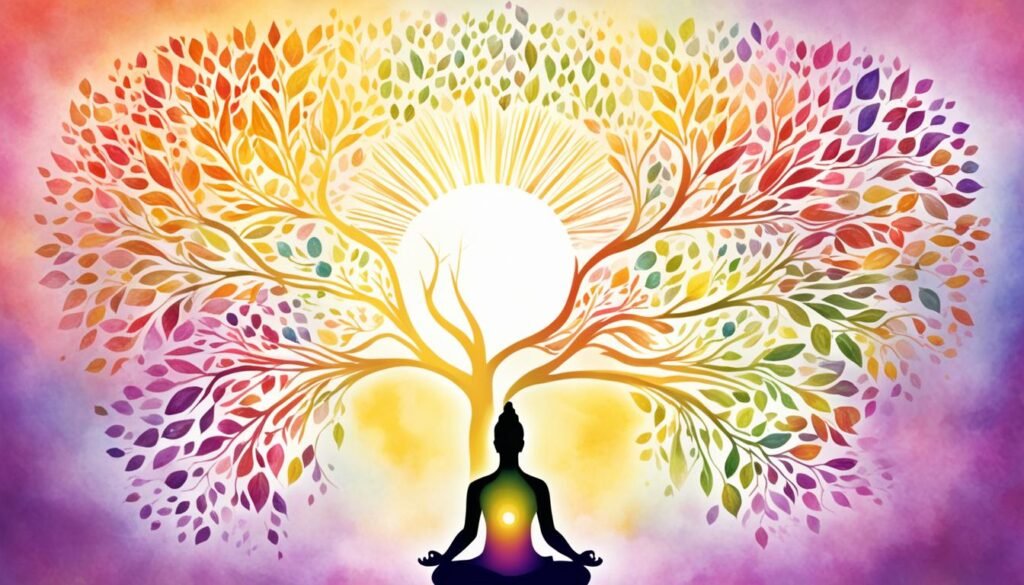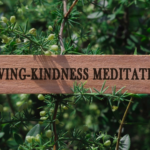“Meditations for Global Healing” Our world is getting more broken and chaotic. About 44 armed conflicts are happening at any one time. Many people now use loving-kindness meditation. They use it to find peace and grow compassion.
This practice is also called “metta” in Buddhism. It helps us be kind to ourselves and others. Studies show it improves our well-being. It slows aging and helps with pain. It also strengthens relationships. It supports our mental health.
As life gets faster, this meditation is key to keeping us sane.

The Radical Act of Being Present
Today’s world is fast. Many find peace in loving-kindness meditation. This practice helps us stay sane and find meaning. It also helps us manage stress and feel secure.
When we stop and focus on the present, we can handle hard feelings with kindness. Being here is peaceful. We don’t worry about the future. This helps our mind, body, and spirit.
Sitting alone fosters deep self-love.
Our society often values doing a lot over being still. Radical self-care means mindful presence. It helps us regain meaning and perspective. It also helps us deal with stress and insecurity. By being aware, we can find peace and balance, even with big challenges.
The Benefits of Loving-Kindness Meditation
Metta meditation is a ancient Buddhist practice. It is for loving-kindness. It helps us feel kind. It also makes us affectionate towards everyone. Many studies prove the benefits of this practice for us.
It can make us kinder to ourselves and others. It also makes us feel better. It can even make us live longer and feel less pain.
It helps us bounce back from tough times. It makes our relationships stronger. And it’s good for our mental health.
Four wishes form the basis of this meditation. We wish for happiness, health, safety, and freedom from pain. We wish this for ourselves and others. This helps us feel more connected. It also helps us feel more compassionate.
Doing this meditation can be hard at first. But it’s worth it. There are guides, like podcasts, from experts. It includes people like Tara Brach and Sharon Salzberg. They can help us learn and grow in this practice.

Loving-kindness meditation can reveal and challenge. It can be uncomfortable. Yet, it is worth the effort.
Establishing a Meditation Practice
Starting to meditate can improve your life. It brings more inner peace and global healing. It doesn’t matter if you’re new or have been doing it for a while. Start small and keep going.
Start with a timer and meditate for two minutes at first. Then, add 30 seconds each day. Aim to meditate for five minutes or more soon.
For beginners, try guided meditation with audio. You can also use videos. There are many phone apps that can help you too. Make sure your place is quiet and peaceful for meditation.
- Focus on your breath to keep your mind in the moment.
- Try different meditation styles to see what you like best.
- Be proud of your small achievements and don’t be too hard on yourself.
Meditation has been around for thousands of years. It has been in many cultures. It’s a great way to heal yourself and the world. With time and effort, you can make meditation a big part of your life. This can make you and the world a better place.

Meditations for Global Healing
The ancient Buddhist practice is Metta. It is a form of loving-kindness meditation. It helps us feel more love and kindness. It makes us want to help others, rather than our friends. This way, we can make the world a better place.
We send love and positive thoughts to all people and the earth. This makes us feel connected to everyone. By doing so, we can make the world a more peaceful and happier place.
Hatred, greed, and vengeance fill the news. Loving-kindness meditation offers a powerful antidote. It helps us heal our hearts. It helps us spread compassion out. It also helps us spread it in.
You can practice Metta meditation alone or with others. It alters how we perceive things. We begin to see that we are all interconnected and have enough.
By feeling more love and kindness, we help heal the world and make a big difference.

With metta, we can face hard times like the COVID-19 pandemic and division. It shows us that love is the answer. We can come together, even when we are different.
Softening Afflictive Mind States
We all feel bad emotions sometimes. Loving-kindness meditation can help us feel better. It’s a formal way to deal with these feelings. It makes hard feelings easier to handle and stops us from getting too caught up in them.
Loving-kindness meditation is great. It helps with strong feelings. It’s useful for anger. Facing these feelings head-on is a challenge. It is a challenge for those who are new to them. This practice helps us handle tough emotions. It stops them from taking over.
Being kind to ourselves and others helps us. It helps us handle our strong emotions. Loving-kindness meditation is formal. It helps us manage bad emotions. It keeps us calm and balanced, even when things get challenging.

Loving-kindness meditation can ease painful feelings. Instead of letting them overwhelm us. We can work with them.
The Embodiment of Loving-Kindness
Loving-kindness meditation goes beyond words and drills. It’s a deep way to show compassion that transforms us. We practice this ancient Buddhist practice. It teaches us to care for ourselves. We develop a profound sense of compassion for all living beings.
This practice uses phrases like “May I be safe, may I be happy, may I be healthy, may I live with ease.” These words have a profound influence on our emotions. They calm us down, get rid of anger, and make our hearts open and strong.
We start to embody those qualities when we say these kinds of words to ourselves. We also say them to others. The breath helps us stay present in the moment as the kindness in our bodies. We learn to accept all feelings. We do this without judgment. This makes us strong and calm.
Practicing loving-kindness meditation has changed my life. It has softened and strengthened me in ways I never imagined. It’s a gift because by embodying compassion, we can help create a more loving world.
Teaching children loving-kindness helps them. It helps them to be kind. It helps from a young age. This builds a habit of caring for others. As we face life’s challenges, this practice gives us hope. It shows us that by being kind, we can help heal the world.
I invite you to tell me how you show loving-kindness every day. Let’s see how this old practice can transform our lives. It will make the future kinder.

Guided Loving-Kindness Meditation
Practicing metta meditation is also called loving-kindness meditation. It is a great way to cultivate self-love and compassion. This guide will show you how to start your journey. Your path is to cultivate self-love. It is also to cultivate compassion.
Settle into a comfortable position and shut your eyes. Take deep breaths to relax your body and calm your mind. Focus on your breath, feeling your belly rise and fall.
- Begin by sending loving-kindness to yourself. Whisper, “May I flourish, may I radiate joy, may I find serenity.” Imagine yourself bathed in a warm, glowing light.
- Then, think of a loved one, such as a family member or a friend. Say the same phrases to them, imagining them in the warm light as well.
- Next, think of someone you know but don’t know very well. Say the phrases to them, seeing them in the warm light as well.
- Finally, think of all beings everywhere. Say, “May all beings be well, may all beings be happy, may all beings be peaceful.” Envision the entire world filled with this love.
Practicing loving-kindness meditation in these steps helps you build self-love. It also helps you build compassion. This can also spread to others. Be patient and kind to yourself as you do this. Over time, you may find that your heart grows. Your relationships improve.

Cultivating compassion and loving-kindness is the key to Buddhism. This practice aims to transform the heart and mind. It can have significant and positive effects on our lives and the world.
Overcoming Hatred and Cultivating Compassion
We live in a world filled with divisions and conflicts. Hating less and growing compassion are key. They help us heal and move forward. The power of compassion shines like a beacon of hope in these tough times. 10
Compassion means feeling for others’ pain. It means wanting to help end their suffering. It comes from knowing that we all want to be happy. This shared goal can help us connect with each other. 10
- It’s hard to show compassion to those who are different from us. We also struggle to accept and give compassion when it’s needed.
- Mindfulness helps us grasp our thoughts. It also helps us grasp our feelings. We handle negative emotions with empathy. We handle them with care.
- We can cultivate compassion. It begins deep within our brains. It changes how we let ourselves help those in great distress.
Thich Nhat Hanh is a famous Buddhist teacher. He shows how caring can change the world. He and his community hold talks. They do this to spread peace and compassion. This helps people understand conflicts. It also helps them heal from them. 10
Compassion is a divine power in all people. All world religions recognize it.
By growing compassion in ourselves. Then, by sharing it with others, we can beat hatred. This path is hard, but it’s vital for a kinder, more united world. 10
The Science Behind the Practice
Many studies have shown this. Loving-kindness meditation (LKM) is very good for us. It’s an old way to be kind to everyone. It makes us feel and do better.
When we do LKM often, it helps us sleep better and focus more. It makes our skin look better and might even help us be happier in the future. It also makes us kinder to ourselves and others.
This demonstrates how powerful loving-kindness meditation is. Being kind to ourselves and others is good for our bodies and minds. It has a positive impact on everyone’s health. It makes them feel better and more relaxed.
The Physiological and Psychological Impacts
- Meditation helps us avoid getting used to things. It stops our minds from wandering and makes us better at solving problems.
- Being mindful can make us more focused for up to five years.
- It also reduces inflammation from stress. This is especially true for those who meditate a lot.
- Loving-kindness meditation makes us want to help others. It makes us feel happy and loved.
Engaging in mindfulness practice reduces psychological bias. It includes less prejudice. And it offers better ways to build trust.
Studies prove this. Loving-kindness meditation is great for us. It helps us be kind and compassionate. This leads to feeling better. It also makes you stronger and helps the world.

Meditations for Global Healing Amid Conflict
The news often talks about hatred, greed, and revenge. Yet, loving-kindness meditation is a powerful way to fight it. It helps us feel more compassion and kindness. Then, we can share these positive emotions with others to heal our world.
Cultivating Compassion in Troubling Times
Loving-kindness meditation combats the world’s negative energies. It fosters emotional bonds. It enables a deep understanding of others’ views. When things seem difficult. This can help us heal our hearts. It disseminates compassion and facilitates global healing.
Hatred, greed, and vengeance fill the news. Loving-kindness meditation offers a powerful antidote. It helps us to heal. Then, we spread compassion outward.
This meditation is for global healing. It makes us feel love for everyone. We see that we are all connected. By sending kind thoughts to all, we can turn our pain into a force for good.
- Recognize the shared humanity in all beings.
- Have compassion for those in pain or in conflict.
- Be kind. Do this to communities that need healing.
- Imagine a peaceful world. It’s full of understanding.
- Commit to creating a world. It should show compassion and empathy.
By doing this loving-kindness meditation, we combat conflict. It enables us to use compassion to solve big problems. This can help make our world a better place.
Expanding the Circle of Loving-Kindness
As we practice 13, our hearts grow bigger. We learn to care for more people than our friends and family. This old Buddhist way helps us be kind to everyone.
Many studies show how powerful this is. It makes people feel happier. They also make more friends. They understand others better. It makes our brains work better at processing emotions.
- Many think that loving-kindness meditation can make us look younger. It does this by reducing signs of aging.
- It helps us control our feelings better, which makes us less stressed.
- It can help with chronic pain and headaches as well.
When we grow our 13 circle, we become more caring. Saying kind words to ourselves helps us feel connected. It does the same for our friends, strangers, and everyone. This makes us kinder. It helps people with PTSD and schizophrenia.
In this practice, you say kind phrases to yourself. Then, to others, to neutral persons, and finally to all beings. It strengthens compassion, like a repetitive exercise.
The 13 journey makes our hearts and minds bigger. It shows us we’re all connected. By practicing more, we help heal the world, bit by bit.
Making It a Daily Practice
Starting a loving-kindness meditation takes time. You must be kind to yourself. Adding it to your daily life can transform you and benefit the world. Here are some tips to improve your daily practice. They are for loving-kindness.
Be Kind to Yourself
Remember, love and kindness may not come right away. Self-compassion is crucial. Be kind to yourself if it feels hard or insincere at first. With time, it will get easier.
Use Resonant Phrases
Try different loving-kindness phrases. See which ones feel right. You might like “May I be happy, healthy, and at peace” or “May all beings be free from suffering.” Feel free to change them to fit you.
Don’t Worry About Perfection
Getting better at metta practice takes time. Some days, you’ll feel very compassionate. Other days, your mind might wander. Accept this as part of the journey. Keep practicing, even for a few minutes a day.
Doing a daily loving-kindness meditation can change you. It can transform your life. It can also transform the world. Embrace the journey. Celebrate your accomplishments. Let kindness radiate from your heart to others.
Loving-kindness is the best mental quality. It is the highest, fundamental, and noblest – Gautama Buddha
The Intersection of Science and Dharma
The old Buddhist meditation on loving-kindness is now receiving much attention. Researchers are discovering how it benefits us. They combine old wisdom with new science. They use it to show its big benefits.
For 25 years, the 15 Washington Mindfulness Community has studied meditation. They found that it makes us feel better on the inside and out. It helps us be more aware, less stressed, and stronger.
Meditation cannot replace other science-based treatments. This is what Jon Kabat-Zinn explains. He founded the Mindfulness-Based Stress Reduction program. The University of Massachusetts Medical School did this. Rather, people consider it an enhancement.
Some people think that healthy suffering is like being sick or sad. Yet, it’s not, says 15 Richard Davidson. He is a professor. He teaches at the University of Wisconsin-Madison. He teaches loving-kindness meditation. It helps us handle tough feelings. It does so in a new way.
Rick Hanson is a New York Times bestselling author. He states that ignoring pain makes our suffering worse. Hanson works at meditation centers. He also lectures on major media outlets. He combines old wisdom with new research.
Hanson discusses the mind on his podcast. He also talks about the brain and consciousness. He explains how meditation can help us grow and heal. It’s about understanding our bodies. It’s about the sacredness of life.
You May Also Like:
Parent-Child Meditation: 5 Deepening Bonds
Resources for Learning Metta Meditation
Learning about loving-kindness (metta) meditation can change your life. There are many resources available to help you learn this ancient Buddhist practice. You can find books, audio guides, and videos to assist you.
Recommended Books
- It’s about lovingkindness. The book is by Sharon Salzberg.
- The Four Immeasurables: Practices to Open the Heart by B. Alan Wallace
- The book titled Boundless Heart. It’s about the Buddha’s path. The path is one of kindness, compassion, joy, and calm. The author is Christina Feldman.
- Real Love: The Art of Mindful Connection by Sharon Salzberg
Guided Meditations and Videos
Recordings and videos make meditation easier. They help me a lot. They help me too. This is especially true if you’re new. Here are some good ones to check out.
- These are podcasts and YouTube channels. They feature experienced teachers. They focus on Metta meditation.
- You can download or stream audio guides. They are for loving-kindness meditation.
- The online resources cover the principles. They also cover the methods of metta meditation. They include tutorials and workshops.
Looking into resources for learning. It can help with loving-kindness meditation. So, can you look into recommended books and media on metta practice? You can read, listen, or watch to learn more. These tools are great friends. They will help you on your journey to cultivate compassion.
Metta is a key part of the Buddhist path. It is a sincere wish. It is for the happiness and well-being of all living beings.
Conclusion
Loving-kindness meditation can help us heal. It can also help the world heal. It makes us feel good and helps us be kind to everyone. This makes us and others feel better.
During the COVID-19 lockdown in South Africa, studies showed it had a big impact. They used apps from HeartMath. The apps demonstrated how meditation affected people. It made everyone feel more connected and calm.
Let’s keep practicing being present and loving. By being kind to more people, we can make the world a better place. Loving-kindness meditation is a powerful way to fight hate. It brings about peace. It helps us feel connected and makes the world a nicer place for everyone.









